Mr. Le Hoang Phong, Academic Director of YOUREORG Education Organization, said that if viewed from the perspective of language assessment, which means assessing language ability in a scientific, systematic and theoretical manner, the 2025 high school graduation English exam has some noteworthy points.
3 noteworthy points of the 2025 High School Graduation English Exam
The first point is the sign of increased authenticity. Some of the texts cited are authentic texts, not artificial passages that were only used for grammar practice as before. Using real texts helps the test to be closer to real communication situations, and at the same time increases construct validity, that is, the extent to which the test truly measures English language proficiency in life and study.
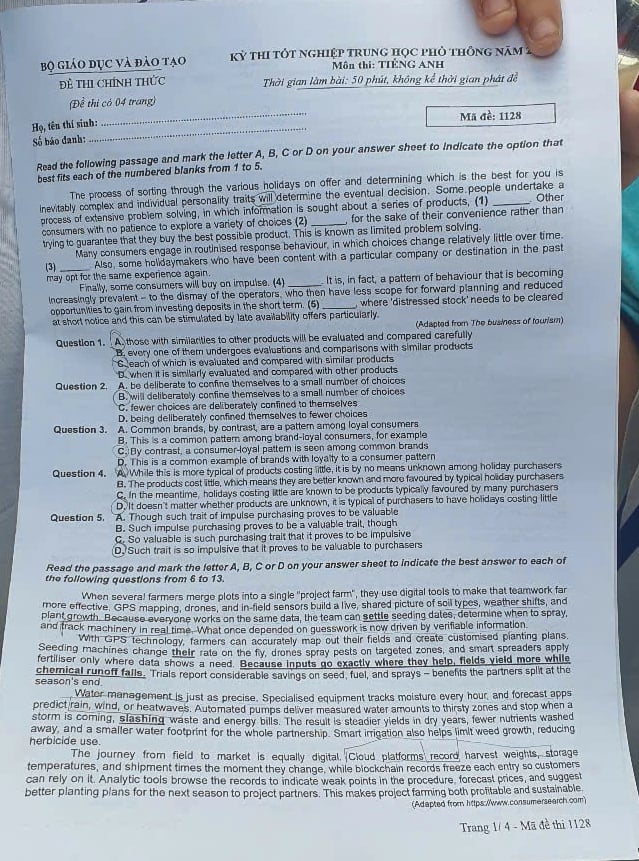
Page 1 of 4 pages of English exam questions for high school graduation 2025, code 1128
PHOTO: THUY HANG
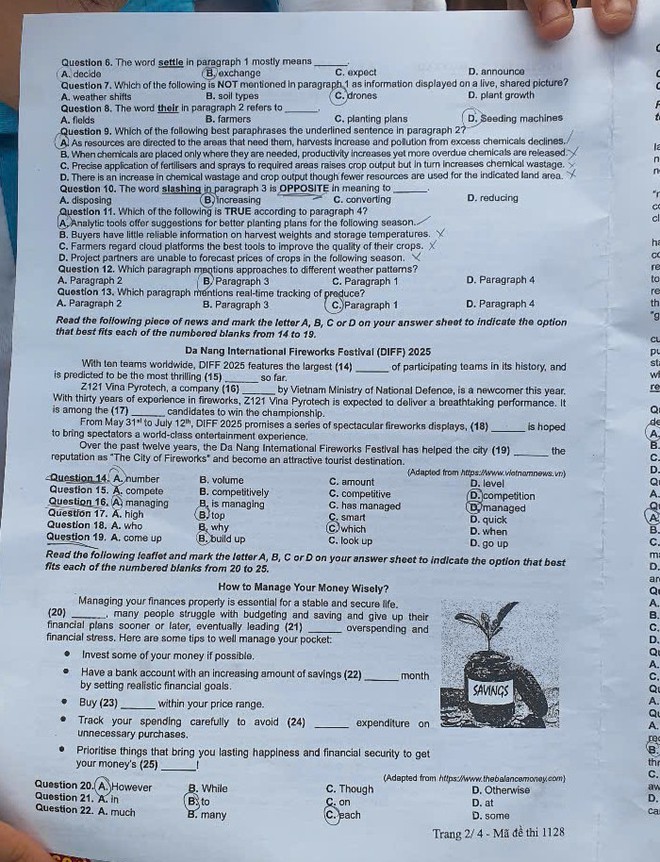
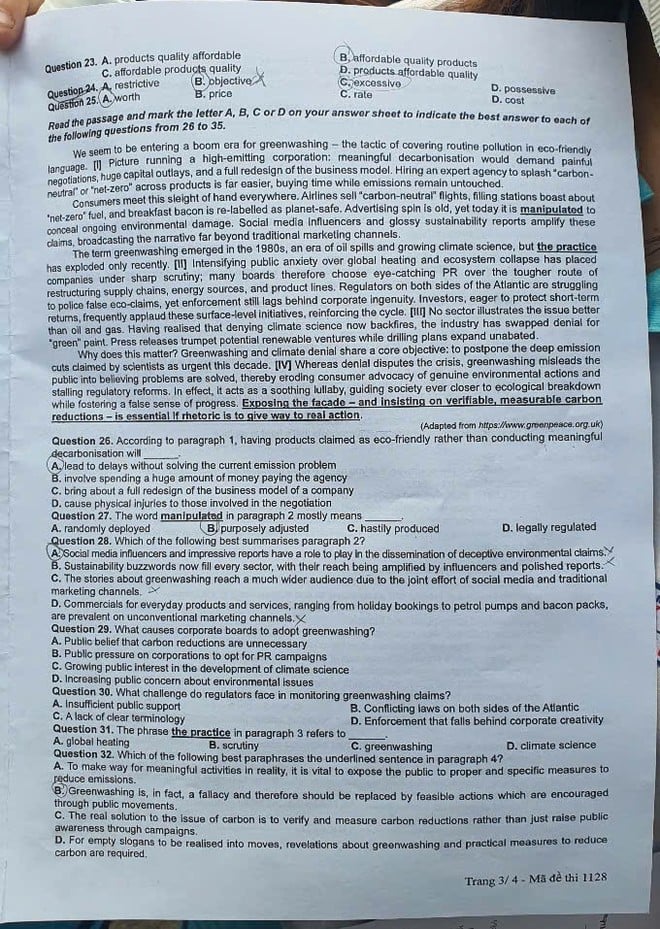
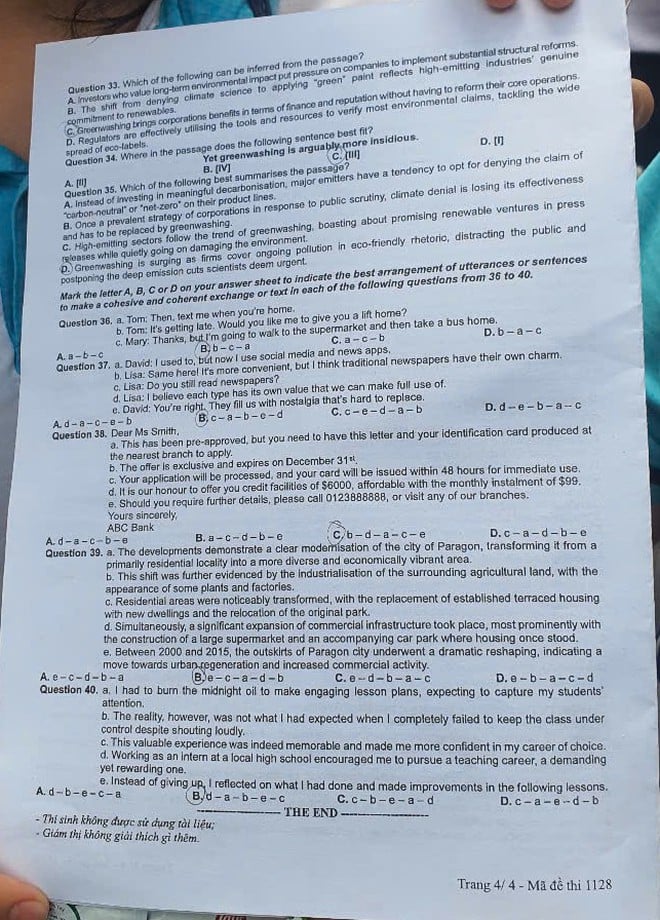
Pages 2, 3, 4 of the 2025 High School Graduation English Exam, code 1128
PHOTO: THUY HANG
Second, the structure of the 2025 high school graduation English exam shows a shift from testing form-focused knowledge to assessing language use in context. Questions require students to be able to choose words accurately (lexical precision), use collocations (word combinations), and organize information in a coherent way (discourse coherence) rather than just identifying tenses, word forms, or individual grammatical errors.
Third, the test incorporates both written and spoken discourse, demonstrating an attempt to assess a more comprehensive range of language skills, a step closer to the requirements for using English in academic and professional settings. This is a clear sign of the compatibility between the competencies being measured and the test design (construct alignment), that is, there is a reasonable connection between the assessment objectives and the test format.
"I believe that, if implemented properly, this test can create a positive washback effect on teaching and learning. When practical competencies are included in the test, both teachers and students will tend to adjust their methods to develop those skills properly," said Mr. Le Hoang Phong.
However, when placing this test in the context of current Vietnamese general education, there are many things to think about. The test may be good academically, but it is not fair to all students.
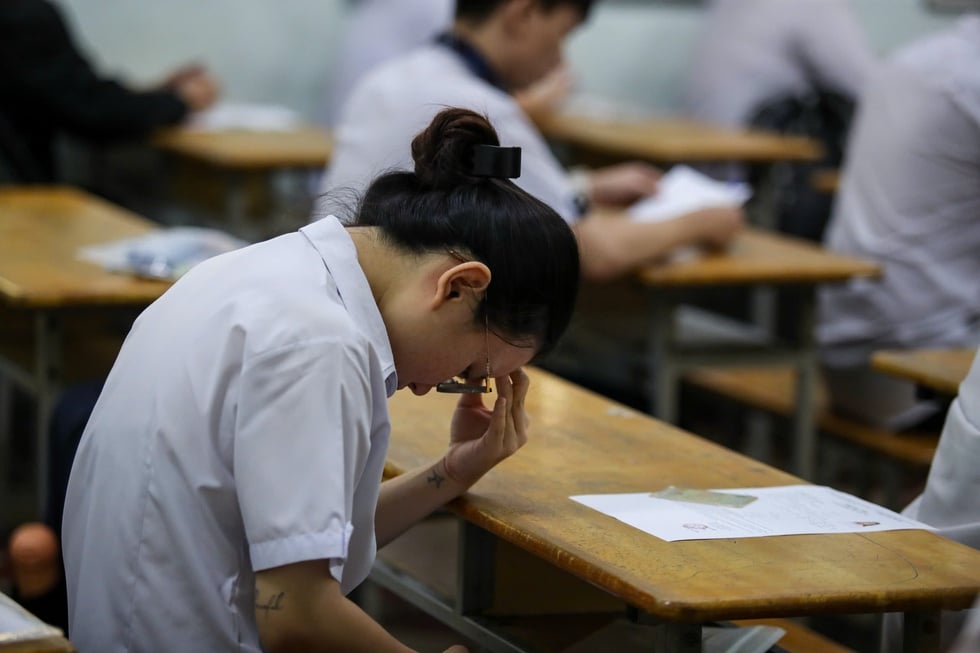
Students are stressed in the 2025 high school graduation exam room
PHOTO: NHAT THINH
The test may be academically good, but it is not fair to all students.
Impossible in all circumstances and learning conditions of students nationwide
"In fact, for students with a good foundation, such as having prepared for IELTS, CAE (Certificate in Advanced English)... or having diverse experience in reading and understanding academic English, this 2025 high school graduation English exam is completely feasible. But the problem is that it does not reflect the diversity in the level, circumstances and learning conditions of students nationwide," Mr. Phong said.
Specifically, according to Mr. Le Hoang Phong, for students in urban areas, especially those studying at specialized schools, selective classes, whose parents are highly educated or have stable economic conditions, early access to quality English, through centers, tutors, or intensive programs, this year's exam is an opportunity to develop their true abilities.
On the contrary, for students in rural, mountainous, orphaned, disadvantaged areas, or localities with difficult economic conditions, learning English is often limited to only 3 periods/week according to the standard program, with a textbook that is heavy on grammar and lacks practice. Not to mention, the quality of the teaching staff also has a big difference between regions.
For this group of students, especially those who do not have the conditions to take extra classes or access foreign language materials on a daily basis, this year's academic exam can become a real "shock".
What is more worrying is that the current exam is simultaneously serving two very different purposes. One is to consider high school graduation, that is, to assess the level of completion of the general education program and to ensure the right to graduation for all students.
The second is university admission, which is to classify academic ability at a high level for selection into universities, especially top universities. These two goals have completely different assessment natures, one side aims for minimum competency, the other side requires deep differentiation (academic stratification).
When combining both into the same exam, the system will face a paradox: If the exam is too easy, it will not be able to classify effectively to serve the admissions goal. If the exam is too difficult, disadvantaged students, who are already disadvantaged in terms of economy, learning conditions, and teacher quality, will be at even greater risk of not meeting graduation standards.
The same exam must be both "easy enough to pass graduation" and "difficult enough to get into university" is an impossible problem.

Mr. Le Hoang Phong, Academic Director of YOUREORG Education Organization
PHOTO: NVCC
"And what is the result? Groups of students in big cities, studying at specialized schools, selective classes, having the conditions to take extra classes, receiving systematic investment... will find the questions "good", "suitable", "classifiable". Meanwhile, groups of students in "village schools", orphans, disadvantaged, remote provinces, who do not have the conditions to take practice tests, and who never go to a center, will find the questions an unfair challenge", Mr. Phong stated his opinion.
Because according to Mr. Phong, the same test, but the preparation conditions are completely different. And that is something that any fair assessment system needs to seriously question.
From the perspective of educational equity, especially the "equity" approach, this year's English exam raises a question worth pondering. According to the equity approach in education, the goal is not to treat all students exactly the same (equality), but to ensure that each student, regardless of their starting point, has the appropriate conditions to achieve their learning goals (according to OECD, 2008; UNESCO, 2017).

Parents and candidates struggle in the 2025 high school graduation exam
PHOTO: NHAT THINH
In other words, according to Mr. Phong, "equity" does not come from uniformity, but from the compatibility between needs and support. From that, it can be seen that: using the same exam to simultaneously consider graduation and university admission is a risk in terms of "equity".
Many people will say that English is an elective subject in the high school graduation exam, if candidates do not have the conditions to study English well, why don't they choose another subject to take the exam? So, is it true that a student in a rural area, despite limited conditions, still tries to study English by himself, but from the beginning "doesn't dare" and cannot register to choose English as the exam subject?
"The graduation exam requires assessing basic competencies to ensure that students are qualified to complete high school. The university entrance exam requires high differentiation to select suitable candidates for higher education. When combining these two functions into a single exam, we unintentionally push disadvantaged students, such as those who do not have the conditions to study extra, do not have access to academic English, do not have quality teachers to support closely... into a "race" for which they have never been fully prepared. The exam can be considered "good" from an academic perspective, but it is unfair to those who only need a diploma to go to vocational school, to work, and now risk being failed by an exam that exceeds their trained capacity," emphasized the Academic Director of YOUREORG Education Organization.
Source: https://thanhnien.vn/de-thi-tieng-anh-tot-nghiep-thpt-bat-kha-thi-voi-dieu-kien-hoc-sinh-ca-nuoc-185250628132930906.htm



![[Photo] Prime Minister Pham Minh Chinh launched a peak emulation campaign to achieve achievements in celebration of the 14th National Party Congress](https://vphoto.vietnam.vn/thumb/1200x675/vietnam/resource/IMAGE/2025/10/5/8869ec5cdbc740f58fbf2ae73f065076)






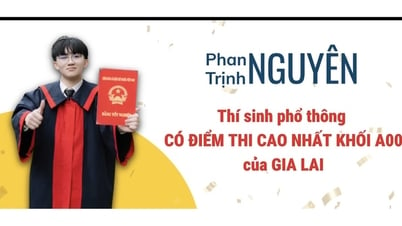




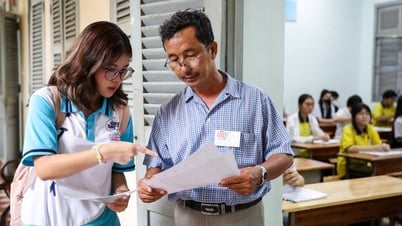


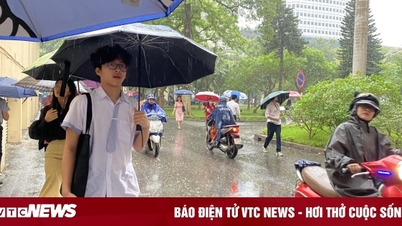
















![[Photo] Bustling Mid-Autumn Festival at the Museum of Ethnology](https://vphoto.vietnam.vn/thumb/1200x675/vietnam/resource/IMAGE/2025/10/4/da8d5927734d4ca58e3eced14bc435a3)
























![[VIDEO] Summary of Petrovietnam's 50th Anniversary Ceremony](https://vphoto.vietnam.vn/thumb/402x226/vietnam/resource/IMAGE/2025/10/4/abe133bdb8114793a16d4fe3e5bd0f12)

![[VIDEO] GENERAL SECRETARY TO LAM AWARDS PETROVIETNAM 8 GOLDEN WORDS: "PIONEER - EXCELLENT - SUSTAINABLE - GLOBAL"](https://vphoto.vietnam.vn/thumb/402x226/vietnam/resource/IMAGE/2025/7/23/c2fdb48863e846cfa9fb8e6ea9cf44e7)

































Comment (0)